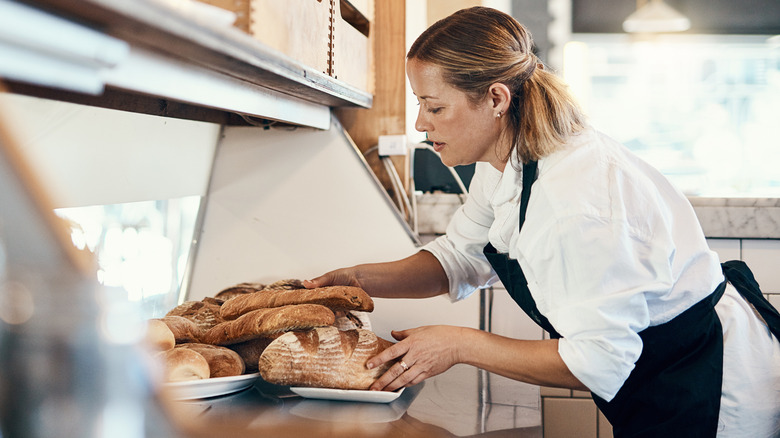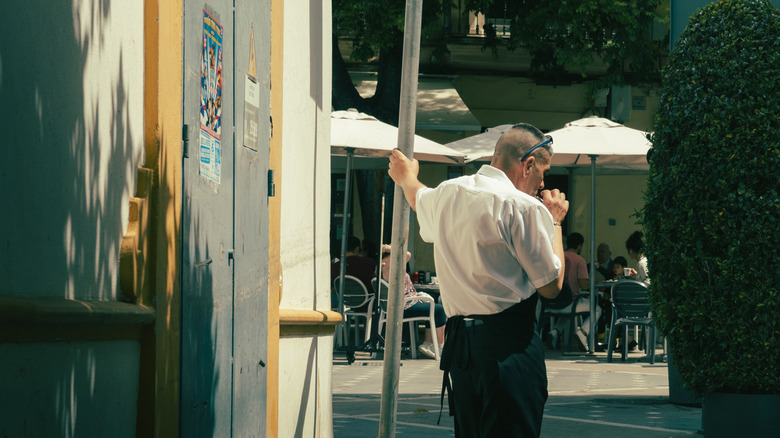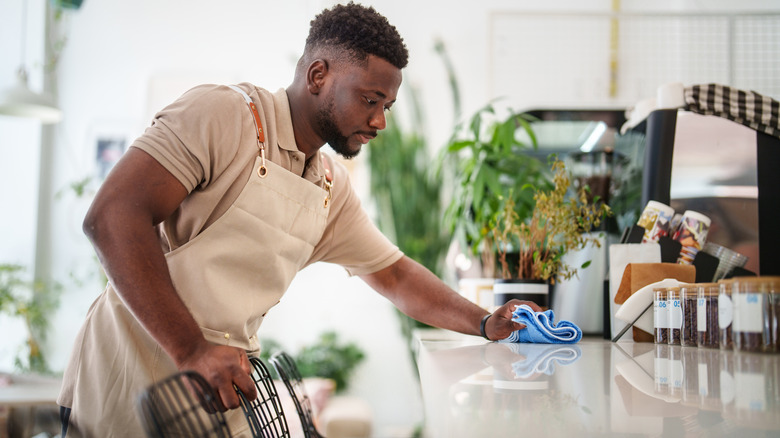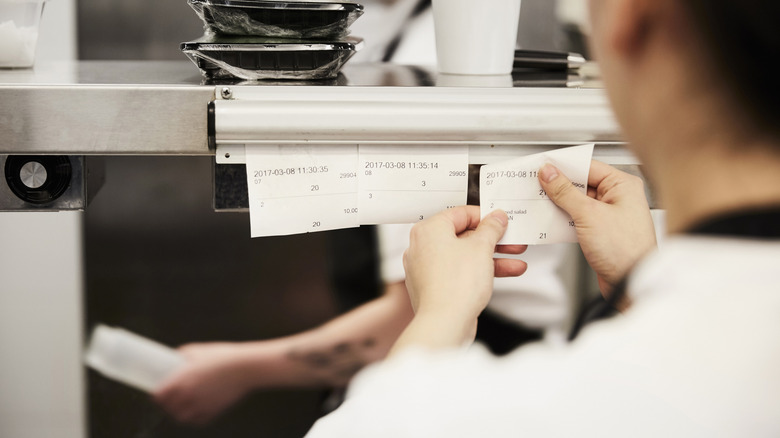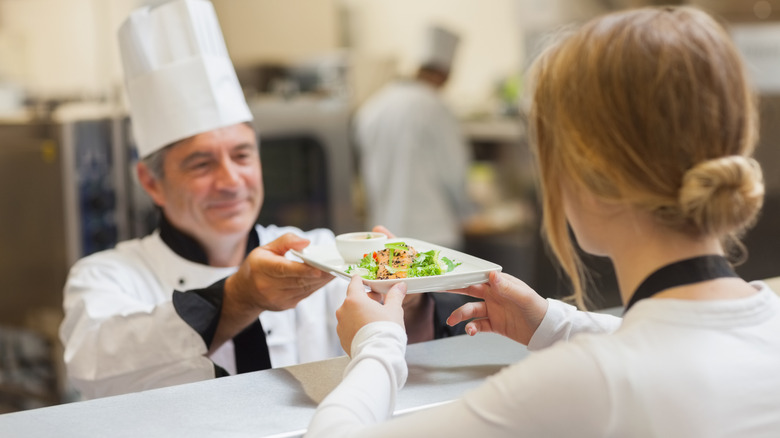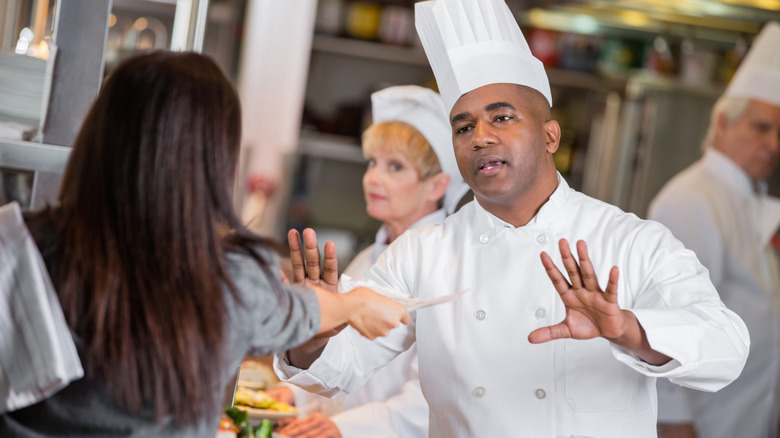11 Things Your Server Is Probably Doing Behind Closed Kitchen Doors
Even the smoothest running restaurants can look like a scene out of "Mad Max" when you leave the service floor and enter the fiery "back of house." The chaos of the kitchen is where the magic of a restaurant is born, from the divine dishes right down to the gracious attitude of the servers. Fans of the late Anthony Bourdain and "The Bear" may think they know what goes on behind the scenes of a restaurant. As accurate as "The Bear" portrays a restaurant kitchen may be, what happens in the kitchen is mostly a mystery to those who have never worked in one. Servers have the unique experience of working on both sides of a restaurant, only one of which the customers they wait on actually see.
I am a former server and bartender who spent the better part of a decade walking in and out of kitchens in diners, country clubs, and biker bars. I'm well versed on the goings-on of all kinds of restaurants, and so are the three professional industry workers I spoke with. From universal experiences to more restaurant-specific practices, serving can be a wild ride of a career. If you've never done it, you may be quite surprised by what your server is likely doing behind closed kitchen doors. Read on to learn the secrets of what servers deal with on a daily basis behind the scenes.
1. Secondary restaurant tasks (aka side work)
What you see your server doing is only the tip of the iceberg when it comes to their tasks and responsibilities within the restaurant. Side work is a normal thing in the vast majority of restaurants, and the secondary tasks are what keep an establishment stocked, clean, and fully functioning. Servers typically have opening, closing, and running side work depending on when their shift starts and ends. The tasks can range from stocking dressings and preparing desserts to refilling the ice well and baking bread. Basically, anything that helps keep things running smoothly.
My serving career saw what felt like a lifetime's worth of side work in kitchens. The most hated and time consuming was scooping whipped butter (for that beloved brown bread from Outback Steakhouse) into ramekins. It doesn't seem that harrowing, but the butter managed to get everywhere no matter what. It took more time to get the butter off my black dress pants and sleeves than to scoop the balls of fat into the hundred tiny bowls. Side work, in essence, is dozens of little tasks like this that make a server's life both easier and harder at the same time.
As annoying as side work can be, the many secondary tasks save a lot of time overall. If all the servers had to complete these tasks as needed, it would take quite a bit longer to get tables settled with their drinks and food.
2. Crying in the walk-in cooler
Holding in tears amid a hectic shift until they're able to reach the freezing sanctuary of the walk-in is a rite of passage for servers. A surprisingly large number of servers break down regularly, and the walk-in cooler has ceremoniously claimed the honor of where the tears are shed. Granted, at my first industry job, it was the space next to the ice machine where overwhelmed servers took their cry breaks.
Once upon a time, industry vet Justin Richie was one of these tearful servers. Richie has been in the industry for over 15 years, and has naturally grown professionally in that time. In an interview with Mashed, he admitted he had a few of these crying sessions, saying, "In my 20s, I was definitely the one who was crying in the walk-in freezer." Rude customers, the stress of remembering a dozen tasks and counting, and screaming head chefs are just a few of the straws to break a young server's emotional threshold.
Sure, some of the staff who do this won't last more than a few months in the industry, but others become lifers like Richie. "This industry thickens your skin," continued Richie. This armor is worn proudly, and the distant walk-in cry session is something a veteran server can look back on to see how far they (and their nerve) have come. Take it easy on the newbies, though, because your ranch might be running late due to their running makeup.
3. Stepping out for a smoke break
The good news is that the national smoking average is way down! The bad news? Despite it being a habit Gordon Ramsay believes no chef should take up, nearly 45% of restaurant workers smoke cigarettes – a figure that is around four times the national estimate. Working in a restaurant can be stressful, and sometimes the only break a server is going to get is a smoke break. It's possible that your server is leaving your table, entering the kitchen, and walking straight out the back door to quickly smoke a cigarette.
Typically, servers will sneak a smoke break when they have a solid window of opportunity. If they've checked on all their tables and there's a bit of time before their food should be ready, they'll feel it's safe to head out back. Responsible servers will let one of their coworkers know where they're heading, and ask if they can keep an eye on their tables just in case. On the rare occasion a server sprints out back in the middle of a rush, it's best to just let them. A smoke break could save both their sanity and the feelings of the people they interact with.
4. Deep cleaning
"If you can lean, you can clean" is a common motto of the willful manager. On slow shifts or days when the manager may not be feeling that forgiving, it's normal for extra cleaning duties be doled out to people who have nothing better to do. Certain deep clean days are set aside periodically as well, and servers are given a couple tasks to tackle throughout their shifts.
One thing every server can agree on is that they hate deep cleaning with a passion, mostly because they don't typically get paid for it. Merica Moreland, who creates fun server content on social media based on her experiences as a waitress, told Mashed that this cleaning is her least favorite part of working in the industry. "It's the deep cleaning that gets me. Pulling out coolers, scrubbing floors and walls, pulling stacks of plates and bowls off of shelves to be cleaned," she states, listing off the kind of work expected.
Justin Richie explained that it's usually when there isn't much going on in the restaurant that servers are expected to do this kind of work. "I've worked at places where management enforces the 'if you can lean, you can clean' rule so we deep cleaned the bar and restaurant," he said. While on occasion this is acceptable, Richie stressed that it shouldn't be a regular thing, saying, "If you're in a restaurant that's consistently slow then it's time to find a new job, but slow shifts happen."
5. Trash talking with other servers
There's a slew of things you can do to get your bartender or server to hate you. Don't get me wrong, servers are there to help and make sure your time at their restaurant is a good one. However, guests can have some pretty terrible restaurant and bar etiquette. This is something that comes with the territory, but you shouldn't be surprised to learn that your server could totally be talking some trash in the kitchen about their rude tables.
For the most part, you can meet some great people serving tables. Unfortunately, the opposite is also true. Servers will rave about their great tables, but talk some serious smack about the ones who cross lines, too. Merica Moreland told Mashed that smack talk is one way she's able to calm herself after particularly difficult interactions. "Venting about my frustrations to my work besties is sometimes the only way I can cool down," she revealed.
Fellow server and TikToker Elliott West had a similar sentiment in his interview with Mashed. He takes a more relaxed, joking approach with his trash talking. While he doesn't mind accommodating unusual food requests, he is certainly going to joke about them in the kitchen with other servers. Rude or entitled guests who think they can walk all over their servers are another beast, though, and West relayed this is one of the customer habits servers hate most.
6. Catering to your special requests
Every restaurant is different, but they all have guests that require a little extra attention, it's just the nature of the beast. Whether a guest is particularly high maintenance, or they have an allergy that needs special care, servers are accommodating. While they may make it look like a breeze, it can be tough to keep track of every extra request, no matter how big or small.
When asked if there was anything guests should know about their servers, Justin Richie said he just wished people knew how much servers actually do to make their experience what it is. "That extra ranch? We prepped that," he said. "That allergy? We reminded the kitchen to change gloves." Servers want your experience with them to be a good one, and they care enough to take extra steps to make sure your needs are met.
Elliott West expressed a similar sentiment, saying he has taken special requests that have taken quite a lot of time to oblige. Unfortunately, West said his efforts aren't always appreciated when catering to special requests takes more than a couple minutes. Be patient and appreciative when your server has agreed to a request, because they may be going above the call of duty for you.
7. Eating unwanted food and leftover birthday cake
Groups who bring their own birthday or celebration cakes are like the holy grail of tables. They're a little extra work if your restaurant expects you to cut and serve their cake, but in most instances that work is rewarded. Leftover cake is a hassle to re-box and take home, so most groups will leave it behind. Even if they don't, they usually offer up a slice for their server. It's not abnormal for a server to go without food for long periods of time, and the sugar is helpful to get through the shift. When a good amount of cake is left behind, everyone in the kitchen is taking a cake break.
When things don't go according to plan, extra food is sometimes to be had. If a dish was rung in wrong or hasn't been made correctly, it can't be sent out to tables. This presents a prime opportunity for servers to eat, and they'll usually swoop in like hawks to get a bite. While servers don't eat on the line, it's not abnormal to see servers huddled in a corner stuffing their faces before heading back out to wait on their tables. Having something in their bellies during an extra long shift is a good thing for everyone, because nobody wants hangry servers on the service floor.
8. Making sure orders are perfect (aka working expo)
Servers wear more hats than you may think, one of which is often the expo worker. The expo worker is the person responsible for making sure each dish is correct and each table receives the correct plates. The kitchen manager is typically the one putting together perfect trays of food for either the food runner or server to bring out to guests. Servers are the next line of defense here, though. They are experts on the menu and know how the food should look, especially if they are the ones who rang it in.
When it's busy or the restaurant is short staffed, the servers regularly step up to help expedite food. They match kitchen tickets with the food that is coming out, making sure that any substitutions or special requests are reflected correctly in the dishes. Some smaller restaurants will always put this responsibility on servers, who will need to track their own tables' foods carefully. This is another major step in the process of you getting your meal that weighs heavily on a server's mind. If your food is both hot and correct, your server likely had more to do with it than just ringing your order in.
9. Buttering up the chef and line cooks
Servers and line cooks are an inevitable match made in restaurant industry heaven (or, in some cases, hell). The budding romance between the two isn't the only reason a server may make doe eyes across the line at one of the cooks, though. Some servers sweet-talk the cooks on the line in order to build a relationship based on kitchen-related favors. You asked for an extra side or two of dressing and received it free of charge on your bill? Your server likely batted their eyes or smooth-talked their way into the cook sliding them a couple ramekins. Your salad came out extra fast? The pantry chef may have a good working relationship with your server.
The dynamic between servers and cooks can be a precarious one. Cooks can perceive the front of house workers as soft and overpaid, as the back of house workers are in harsher conditions with no tips. This can be a source of resentment, which is lightened by servers being overly sweet and thankful to the kitchen workers. During the rush, it's easy to sling an attitude back and forth in the kitchen, but the smart server will still lay some love on their back of house counterparts.
10. Assisting other servers
When everyone is in the weeds (really busy), it's basically every server for themselves. Outside of the rush, though, servers are typically pretty helpful people. The team tends to take care of each other, both on and off the clock. So, if you haven't seen your server come back out of the kitchen in a while, there's a chance they're helping one of their fellow servers with a particularly gnarly task or trying to work out an issue.
I've worked at restaurants where managers tend to disappear, and if an issue arises it could take seemingly ages to track them down. Senior servers will typically step up and help solve problems instead of wasting vital minutes on the fool's errand of finding a manager. Sometimes certain servers will even have manager codes for the computer system, in anticipation of needing to override a mistake or issue.
Training is a regular thing in restaurants as well, and trusted servers have a tag-along newbie, or shadow. Usually these shadows will be introduced when they greet your table, but sometimes a newly released shadow will still need plenty of assistance behind the scenes. Don't assume your server is dragging if they're taking a while to get out of the kitchen, they may be lending a kind hand to a coworker in need.
11. Cursing
Sometimes, we wish the kitchen stocked pillows we could scream into. Once a server has graduated from crying in the walk-in, they graduate to cursing to the void once those kitchen doors shut. It may sound dramatic, but honestly the cursing just flows right along with whatever expletives the line cooks are slinging. It's usually akin to a team building exercise, but sometimes servers and cooks will be cursing at each other too. The heat of the kitchen can fuel some intense arguments, particularly over last minute changes to orders. At the end of the night, though, everyone usually laughs the fiery encounters off over a drink.
For Merica Moreland, that looks like swearing up a storm after leaving particularly difficult customers. "I wait until the door to the kitchen closes and I begin cursing like a sailor," she told Mashed. Servers need to hold their composure while on the floor, but once they enter the kitchen they can be "at ease." If you ever hear the muffled screech of a sailor's curse coming from the kitchen, just know that your server is going through it. Don't worry, you'll still get service with a smile and that extra ranch you ordered once they've let off some steam.

